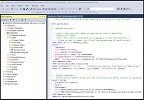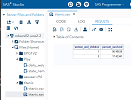Fritz Passow's Data Analyst Portfolio
 LinkedIn
LinkedIn
 GitHub
GitHub
![]() Kaggle
Kaggle
 About Me
About Me
Projects
Recipe Ingredients Analysis (Python, Pandas, Seaborn, Tableau)
 Analyze ingredient lists from a free recipes dataset on Kaggle using Python, Pandas, and Seaborn. The main analysis is on Kaggle, here. And some exported data can be explored on Tableau Public, here.
Analyze ingredient lists from a free recipes dataset on Kaggle using Python, Pandas, and Seaborn. The main analysis is on Kaggle, here. And some exported data can be explored on Tableau Public, here.
Exploring Covid Data with SQL (Transact-SQL)
 Download data using curl
Download data using curl
Use a script to load or update SQL Server
Aggregate daily data to monthly
And then look for countries and months with high infection rates, vaccination rates, or death rates
Everything is in this Github repo and the analysis is presented
on a markdown page here
Load Data on City Populations and Combine With Covid Data Using SQL (Transact-SQL)
 Load population data for cities and many countries. Create a table translating country names to ISO standard three-letter country codes.
Add country codes to the city population data. Use country codes to join per-country data about covid with the population
of each country’s largest city.
Load population data for cities and many countries. Create a table translating country names to ISO standard three-letter country codes.
Add country codes to the city population data. Use country codes to join per-country data about covid with the population
of each country’s largest city.
Everything is in this Github repo and the analysis is presented
on a markdown page here
Using Kroger’s API (Python, HTTP APIs)
 Kroger is a midwestern grocery chain that offers a public REST API. This Kaggle notebook demonstrates how to access the API using very simple Oauth authentication and how to fetch information on Kroger stores and products. This data might be useful for data analysis related to food, prices, and geographic trends.
Kroger is a midwestern grocery chain that offers a public REST API. This Kaggle notebook demonstrates how to access the API using very simple Oauth authentication and how to fetch information on Kroger stores and products. This data might be useful for data analysis related to food, prices, and geographic trends.
Explore frequencies of US baby names from US Social Security data using SQL and Tableau (SQLite, Tableau)
Use SQL to extract an interesting subset of data from an SQLite database on Kaggle.
Then analyze with Tableau Public.
Explore US baby names with SQL and Pandas (SQLite, Python, Pandas)
Kaggle has some Sqlite datasets. These are fun to play with and the results are easy to share. This notebook does some analysis of Social Security names data, first with SQL and then with Pandas.
Some Statistics on D&D Spells ( Python, Pandas, Seaborn)
 No earth-shattering insights here. Just some practice slicing, dicing, and graphing with Python, Pandas, and Seaborn.
No earth-shattering insights here. Just some practice slicing, dicing, and graphing with Python, Pandas, and Seaborn.
Titanic Data Set in SAS (SAS)
 A small exercise working on the Titanic data set in the free online version of SAS Studio. SAS is a huge product
with an old and unfamiliar syntax.
But I think it’s useful for everyone to have seen the UI and be able Google their way through getting data in and out.
A small exercise working on the Titanic data set in the free online version of SAS Studio. SAS is a huge product
with an old and unfamiliar syntax.
But I think it’s useful for everyone to have seen the UI and be able Google their way through getting data in and out.
Google Data Analytics Certificate: Final Project (R, Excel)
 Analyze ride data from a fictional bike-share company using R and Excel.
Analyze ride data from a fictional bike-share company using R and Excel.
Writing
R Notes for Programmers
Quick facts about the R programming language, summarized for people who already know other languages. I started learning R because the Google Data Analyst Certification course uses it. But all the R courses I found were also teaching how to program. So I took time out to research the question of “what kind of language is R?”, so I could stop wondering about these things while doing the lessons.
Mnemonic for SQL Query Order of Execution
 For me, the order of execution finally explained why some things are legal or illegal in various parts of a query. For example, the fact I can’t use a name created by an AS clause if the SELECT line that contains it hasn’t run yet. Credit to https://www.mnemonicgenerator.com/ for some early ideas.
For me, the order of execution finally explained why some things are legal or illegal in various parts of a query. For example, the fact I can’t use a name created by an AS clause if the SELECT line that contains it hasn’t run yet. Credit to https://www.mnemonicgenerator.com/ for some early ideas.
Bootstrap for Engineers
How non-designers can easily use Bootstrap to modernize the look of bare HTML.